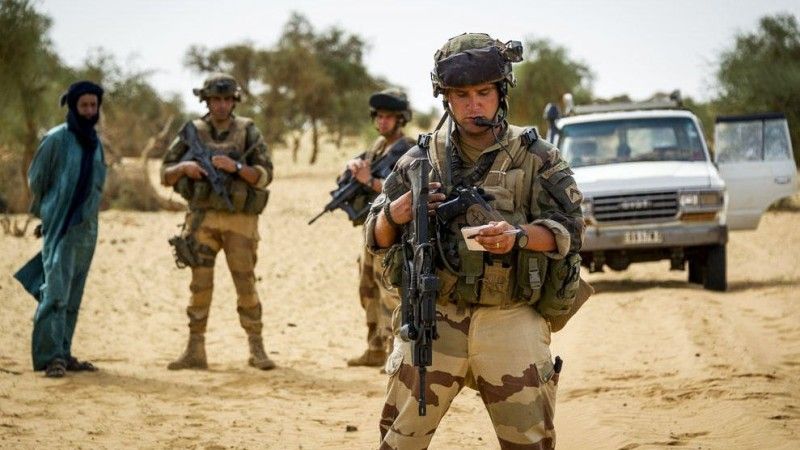- WIADOMOŚCI
France Retreats from Africa: A Major Shift in Military Strategy
Paris is opting to reduce the number of soldiers in additional African countries. Following the significant withdrawal from Operation Barkhane (over 5,000 troops) and subsequent coups in Mali, Burkina Faso, and Niger, the next phase of adjusting its presence is underway. France plans to maintain its missions with a small number of training forces but in a greater number of West African countries. From the current 2,300 soldiers, only 600—or even fewer—will remain after the termination of the defence agreement with Chad.

France has often faced criticism for „fleeing” in the face of the Russian Federation and military juntas in the Sahel countries. While it is true that all relations have been severed and Paris has no further prospects for cooperation with Mali, Burkina Faso, and Niger, the political, economic, and military situations in these states are dire. Years of anti-terrorist missions by France and its allies (Serval, Barkhane, Takuba) did not entirely defeat terrorism. Now, after a complete withdrawal from the region, the Sahel is grappling with a massive problem: numerous terrorist groups, with juntas controlling on average only 50-70% of their national territories.
The Russian Federation, which was expected to become the new power in the region, is struggling to manage the Tuaregs and Arabs in Mali while also being attacked by Al-Qaeda and offshoots of the Islamic State from the other side. The economic benefits and control of the Sahel currently offer no tangible advantages for the Kremlin. At present, the main achievement appears to be driving France out and „creating” threats for the Maghreb and, further, Europe. From an investment or armaments perspective, Moscow has gained very little (Turkey is selling its drones), while Paris is attempting to retaliate by strengthening ties with Yerevan.
Paris: Where and Why?
For France, bases in Senegal and Côte d’Ivoire remain key. In Senegal, the relationship between Presidents Macky Sall and Emmanuel Macron presents challenges. While both leaders attempt to find common ground, Dakar perceives France’s significant economic influence as neocolonialism. Nonetheless, French troops and military training programs continue, as Senegal faces threats from terrorist groups along its border with Mali. Although France was expected to play a pivotal role in security matters, President Sall has indicated that the French should close their military bases and focus solely on training efforts.
Côte d’Ivoire has become an increasingly important foothold for France, the United States, and even Ukraine (interestingly, Poland once considered establishing an embassy there). French and American forces have relocated troops from Niger to Côte d’Ivoire, ready to conduct joint missions and establish a base (notably a drone center). Despite maintaining its involvement, Paris has decided to reduce troop deployment from 900 to 600.
Chad is another significant country. Initially, all troops from Niger were expected to be redeployed to Chad, positioning it as France’s new stronghold. However, Chad’s leader, Idriss Déby, is focused on collaborating with the United Arab Emirates while maintaining ties with Russia. Furthermore, Hungary has filled the military presence gap by sending a contingent of 400 soldiers. France’s presence will now be limited to three bases with a combined force of 1,000 troops, marking a drastic reduction from its previous several-thousand-strong deployment in the Sahel. The chances of increasing this presence are slim, especially after Chad terminated its defence agreements with France at the end of November 2024.
In Djibouti, no personnel changes are planned, despite initial intentions to do so. The situation evolved following Hamas« attack on Israel and the subsequent conflict in Lebanon. The Horn of Africa is now seen as an ideal observation point. While Djibouti initially sought to reduce the space rented to France, negotiations led to an agreement for increased payments by Paris. Ultimately, an understanding was reached.
In Gabon, where a coup was accepted by the Élysée Palace without severing ties, troop numbers have been reduced from 350 to 100. The mission there aims to maintain a foothold in Central Africa, serving as a link between East and West Africa.
A New Approach
There are positive elements for Paris in its revised military strategy in Africa. A significant shift focuses on making the cooperation more training-oriented. Notably, partnerships with senior military officers have been emphasized—a smart and strategic move by Paris. Strong ties with African generals secure influence in the event of military coups. However, France’s international prestige has diminished as it openly „withdraws its troops” from the continent.
In the context of new locations, France has decided to partially strengthen its presence in Africa. This will primarily take the form of small contingents (ranging from a few dozen to a few hundred soldiers) focused on collaboration rather than French dominance. The first key partner is Benin, which has already received several VAB armored vehicles and Puma helicopters. Relations with Côte d’Ivoire will also be reinforced, with France and the US jointly establishing a drone center. Additionally, both countries will receive 40 armored vehicles originally intended for Niger. The final new partner is Gambia, serving as a light force deployment alongside neighboring Senegal. France’s goal remains to maintain its presence in West Africa.
The narrative of a „fleeing France” and a „victorious Russia” needs to be debunked. The Sahel is not the entirety of Africa. At the same time, Paris has come to understand that military bases alone are insufficient to maintain its sphere of influence. Of the 2,300 troops currently stationed, only around 600—or possibly fewer—will remain. Thus, an era of dominance ends, giving way to an era of training and collaboration.















